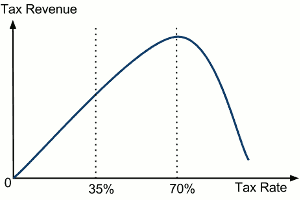We Can Do Better
2/1/2014
6/16/2017
Note: In the time since I wrote this post, my opinions about taxation have changed. I no longer view taxation as a way to fund government spending. Instead, I see it as a tool to remove excess money from the economy. In my — admittedly controversial — opinion, government spending need not balance with tax revenues.
One thing that economists and software developers have in common is a love of optimization. We always want to find the best way to achieve the best results. And in pursuit of that goal, we repeatedly ask questions about how we can improve things.
For example:
- How do we execute this task most efficiently?
- How do we maximize profits?
- How do we minimize poverty?
While it's usually difficult to answer these types of questions definitively, there's one thing I know for sure: we can almost always do better.
Any Americans reading this will likely agree that the United States government is neither perfectly effective nor perfectly efficient. To gauge the government's efficiency, we can search for instances in which the government is wasting time, money, or other resources. But to properly gauge how effectively the government serves its purpose, we must first identify that purpose. And even anarchists will acknowledge that the responsibility of the government is to represent the collective interests of society.
But do we even need a government? Yes. The prisoner's dilemma is a classic game that demonstrates why individuals don't always cooperate even when it is in their best interest to do so. The interests of a society amount to more than merely the sum of its members' individual interests. For this reason, we do indeed need a government.
Some people argue that reducing government revenue would force the government to operate more efficiently. That may well be true, but I'm not convinced that the government would be more effective in serving society's interests. On the other hand, simply increasing government revenue will immediately allow the government to be more effective.
Can we increase government revenue? And if so, how? Well, it depends where we fall on the Laffer Curve:

As the above chart shows, government revenue will be zero if we don't tax at all. And if we tax everything, nobody will be able to conduct any taxable business. We maximize revenue by taxing at some hypothetical sweet spot in the middle. But should we try to maximize it? Perhaps not. Perhaps there's a limit to society's interests beyond which any additional government revenue would serve little use. But if such a limit exists, we're nowhere close to hitting it when, as I discussed in my previous post, people remain poor and hungry in our economy of abundance.
The government can be more effective with access to more resources and also by more efficiently spending its resources. The government is inefficient not because it's rich, but because it is immune to the market pressures that private companies are subject to. Businesses succeed or fail through economic Darwinism. The government has no competition.
Increasing government efficiency requires actually being smart about resource allocation. But everybody has their own ideas about the best ways for the government to spend its money. So this is where politics come into play:
We know where to start: the best measure of opportunity is access to a good job.
— President Obama
According to this week's State of The Union address, President Obama wants to spend government funds on creating jobs and raising the minimum wage. He wants people to be able to earn a decent living through jobs. But does it make sense to create jobs simply for the purpose of giving people work to do? Does it make sense to expect people to earn a living? Is it in society's best interest for citizens to need jobs? I'm not so sure. Propping up the labor market is getting awfully expensive and people have better ways to spend their time than busywork.
My friends often criticize me for being too much of an optimist. But our society has so much room for improvement — and our government can be so much more effective — that I have a hard time imagining that we're not moving toward a brighter more prosperous future. I'll concede that I might be an optimist. But it's only because I know we can do better.
